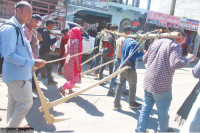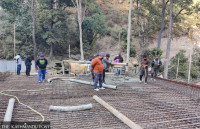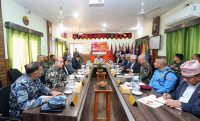National
Nepali editors condemn Chinese embassy’s statement regarding the Post
Seventeen editors, in a statement issued on Wednesday, condemned the embassy’s use of disparaging language and reiterated the Nepali constitution’s guarantee of full press freedom.Post Report
Editors of Nepal's dailies and online portals have condemned the Chinese embassy in Kathmandu’s statement regarding the publication of an article and its accompanying illustration.
Issuing a statement on Wednesday, a group of 17 editors said that their attention had been drawn to a press statement issued on Tuesday by the Embassy of China in Kathmandu.
“We respect the right of an individual or organisation to express their disagreement over materials published in the media,” the editors said in a statement. “But we disagree with the disparagement and threats issued by naming any particular editor. We condemn such an act.”
.jpg)
In its statement, the Chinese embassy not only took exception to the article and the accompanying illustration published on the Post on February 18, but also identified the Post’s Editor-in-Chief Anup Kaphle by name, employed disparaging language, and went so far as to make a veiled threat of “further action.”
The Post had republished the article titled ‘China’s secrecy has made coronavirus crisis much worse” by Ivo Daalder, a former US ambassador to NATO, which was originally published in The Korea Herald, a member of Asia News Network. The accompanying illustration showed Mao Zedong wearing a mask.
“We would also like to remind the embassy that it breached diplomatic decorum in doing so,” said the statement, undersigned by Akhilesh Upadhyay, Ameet Dhakal, Arun Baral, Kiran Nepal, Krishna Jwala Devkota, Gunaraj Luitel, Narayan Wagle, Purna Basnet, Prakash Rimal, Prateek Pradhan, Prashanta Aryal, Basanta Basnet, Rajendra Dahal, Shiva Gaunle, Sudheer Sharma, Subhash Ghimire, and Hari Bahadur Thapa.
“Nepal's constitution has guaranteed full press freedom, and we are committed to exercising and protecting it,” they said.




 10.41°C Kathmandu
10.41°C Kathmandu












